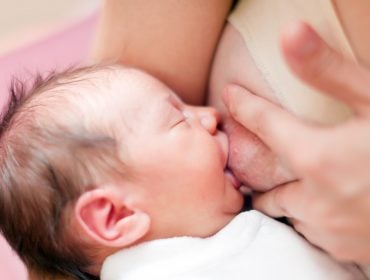Herpes on Breasts
When people think of herpes, they often think of cold sores symptoms or blisters and lesions in the genital area, but herpes can manifest in other parts of the body, including herpes on breasts. Other places it appears are the rectum, eyes, by the nose, and inside of the mouth. They can appear as a rash, small red bumps, open sores, or a cluster of liquid filled blisters. Oftentimes, they are painful, can have a tingly feeling, or are tender.
HSV-1 and HSV-2
The majority of oral herpes cases (cases in which the infection manifests on or near the mouth) are caused by HSV-1 (herpes simplex virus type 1). Most genital herpes cases (cases where symptoms manifest on or near the genitals) are caused by HSV-2, a different strain of the herpes virus—although instances of HSV-1 genital herpes infections are on the rise due to more and more people participating in oral sex. Herpes can be contracted even when no visible signs or symptoms are present.
Oral herpes can be prevented with the use of dental dams and condoms. Do not use a dental dam or a condom for yourself after using it on another person and do not use the same barriers on multiple partners. Always use clean barriers for each sexual act. Make sure to read the expiration date and to see if there are any tears or puncture holes before using these barriers. Keep them on until finished.
If you have already been infected with herpes, then herpes can recur unexpectedly, especially during times when the immune system is suppressed. These health factors can cause a herpes outbreak:
-
- Fever, chills
-
- Menstrual cycle
-
- Stress
-
- Surgery
Herpes in HIV positive people can be more acute, as their immune system is already compromised.
While there is no cure for herpes, it usually clears up in a few weeks. For frequent outbreaks, a doctor may recommend a prescription – known as prophylaxis – to take every day in order to prevent future outbreaks. There are also antiviral creams and pills available on the market that can make healing a lot faster. Whether you go with a cream or a pill, they both tend to contain the same active ingredients that make them so effective – valacyclovir, famciclovir, and acyclovir.
Oral herpes can be spread by sharing drinks, straws, and eating utensils, as well as kissing and other actions that involve having the mouth on infected body parts. These strains of the virus are spread via skin or mucous membrane contact. While it is rare to get herpes on breasts, it does happen. For example, foreplay or sexual activity that involves the breasts and/or nipples with contact from a mouth or potentially the genitals of someone with a herpes infection can lead to a herpes infection of the breast(s) and result in herpes lesions.
Can You Breastfeed With Herpes
This is especially serious for breastfeeding mothers, as babies can potentially contract an oral herpes infection while breastfeeding if the mother has a herpes infection that originated at her breast. The reverse is also possible—if an infant has contracted herpes from a kiss by a family member, friend or neighbor with a symptomatic or asymptomatic herpes infection, they can pass it along to their mother. Herpes is not spread through breast milk.

Herpes on breasts can sometimes look like a bacterial infection that causes plugged milk ducts. It’s best to get any sort of lesion or sore on the breast checked out by a doctor if you are breastfeeding, though it is rare for it to be herpes. Herpes has only been reported in only three cases by nonlactating women.
To help prevent the spread of herpes to an infant:
-
- Never allow the baby to touch a sore or blister with any part of their body
-
- Never kiss a baby if you have a cold sore
- Never touch a baby after touching a sore or blister unless you have thoroughly washed your hands after
Herpes cases are especially dangerous to infants, as they are most susceptible to herpes meningitis or herpes encephalitis, which can cause permanent damage to their nervous system or death. If a nursing woman suspects she has a herpes infection on her breast, it is important to stop breastfeeding right away. Instead, she can express or pump milk out of her breasts. If she decides to use a pump, it is important that the parts of the pump that touch the herpes infection do not also come in contact with the milk. This will be especially hard if the infection is on the nipple. If the milk does come in contact with a part of the pump that has touched a herpes sore, then the milk must be disposed of.
Herpes on Nipples
It is extremely rare for herpes to appear on the breast, but when they do, it is characterized by sores on the nipples or surrounding areas. In this rare case, a woman went to the hospital with a swollen breast with red patches and complained of an itchy feeling. There was a fluid filled blister on the areola. The medical staff drained the blister, scraped some of the skin off the lesion, and sent the samples off to the lab where they confirmed it was herpes. 
Breastfeeding mothers are advised to feed their babies from the non infected breast. Don’t touch the sores or lesions, don’t allow any contact for the baby to touch them, and don’t let the infected breast touch the non infected one. If you are unable to breastfeed your baby because of herpes on the nipples and would prefer them fed real breast milk instead of formula, then you can look up a milk bank in your area to find donor milk from other mothers.
How Common Is Herpes on Breasts?
Herpes can affect the central nervous system, eyes, viscera, and any mucous membrane surface. Only 2% of herpes lesions are reported to be on the breast, making it a very uncommon infection site. In most cases, according to the National Institute of Health, oral or genital herpes is reported first, then it can spread to the breast. Breasts are usually not the first reported infected area.
If the breasts are infected, they can feel swollen with red patches at first before the herpes outbreak occurs. Sometimes the herpes sore looks like a fluid-filled blister. With an outbreak, you can experience symptoms similar to having a flu. When future outbreaks happen, they will not last as long as the first one. That’s because your body will be able to build up immunity to it over time and help control outbreaks. Future outbreaks may not be as painful as the first one either.
Herpes is not curable, however, outbreaks and the frequency of outbreaks can be managed with antiviral medication. Early detection may help decrease the frequency and intensity of outbreaks. It is extremely important to see a healthcare provider right away if you suspect you have herpes or are experiencing rashes or blisters in your eyes, mouth, around the lips and nose, breast(s), or in the genitals and rectum.
We are here for you. If you have questions for a member of our medical team, don’t hesitate to reach out to us at STDCheck.com
Medically Reviewed by Colleen Ryan, MD on September 11, 2022
Secure and Confidential
STD testing services
The fastest results possbile - available in 1 to 2 days

Tagged
Categorized As
Author: Esther Jordan
Esther Jordan has been a writer ever since she can remember. She has always loved the free gift of self-expression through journaling, creating stories, and sharing life experiences in front of audiences. Public speaking and creating content has been a strong suit of hers since high school. Immediately after college, she received a paid position as an search engine optimization (SEO) writer in 2010 when SEO was still a very brick and mortar concept for a lot of small businesses. It was a time of do-it-yourself websites and online magic that everyone wanted and either referred to it as SEO or pay-per-click (PPC).




